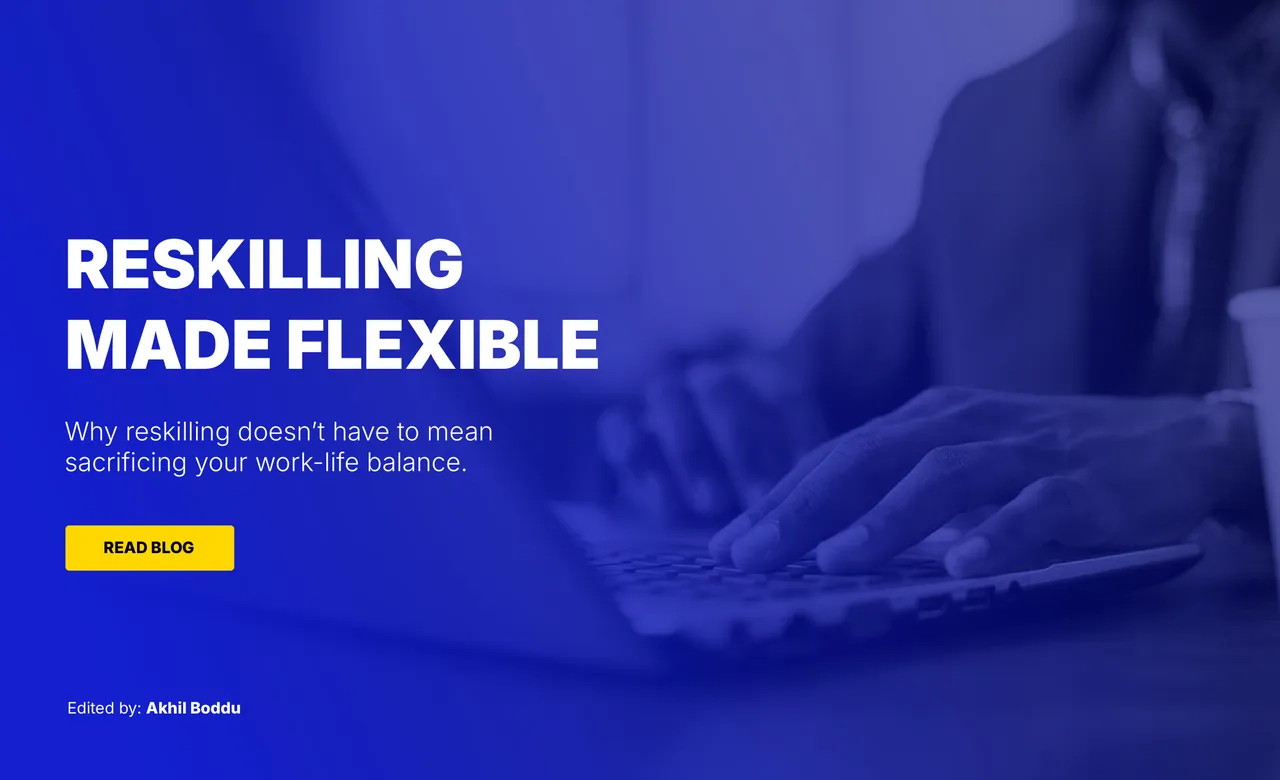The traditional career path of "study, work, retire" is rapidly becoming obsolete. In today's dynamic economy, 80% of employees actively want their employers to invest more in upskilling and reskilling programs, while professionals across South Africa are discovering they can transform their careers without sacrificing their current income. The question isn't whether you can reskill while working, it's how to do it effectively.
With South Africa facing a shortage of 70,000+ high-end digital jobs and 78% of part-time bootcamp graduates successfully completing their programs, flexible learning has emerged as the most practical pathway for working professionals to transition into lucrative tech careers. Whether you're stuck in a dead-end job or simply seeking better opportunities, the data shows that strategic reskilling while employed isn't just possible, it's the smartest approach for most people.

The Rise of Flexible Learning: Why Now?
Market Demand for Continuous Learning
The skills landscape is shifting at an unprecedented pace. According to LinkedIn's workforce research, job skill sets have changed by 25% since 2015, and this number is expected to double by 2027. This creates a compelling case for continuous learning rather than one-time educational investments.
South African employers are responding positively to this trend. 71% of employees report satisfaction with their company's upskilling initiatives, while 69% say reskilling has directly improved their job performance. More importantly, 64% feel increased job security after participating in reskilling programs.
Employer Support is Growing
Companies are increasingly supportive of employee development, recognizing it as a retention and productivity strategy. Research shows that organizations with robust learning cultures experience 30-50% higher retention rates, making employee education a win-win investment.
Forward-thinking South African employers are offering:
- Flexible work arrangements to accommodate evening or weekend classes
- Tuition reimbursement programs for job-relevant skills training
- Internal mobility opportunities for newly skilled employees
- Mentorship programs to support career transitions

Flexible Learning Formats: Finding Your Fit
Understanding Your Options
The landscape of flexible tech education offers multiple pathways, each suited to different professional circumstances and learning preferences.

Part-Time Coding Bootcamps
Part-time bootcamps represent the sweet spot for working professionals. These programs typically require 15-20 hours per week commitment and achieve 78% completion rates. Most part-time bootcamps offer:
- Evening classes from 6:00-9:00 PM on weekdays
- Weekend intensive sessions covering 6-8 hours
- 6-24 month duration depending on intensity
- Live instruction with real-time interaction
- Career support services including job placement assistance
Popular part-time bootcamp schedules:
- Monday/Wednesday evenings + Saturday mornings
- Tuesday/Thursday evenings + Sunday intensive
- Weekend-only programs for maximum flexibility
Online Self-Paced Learning
Online self-paced programs offer maximum flexibility but require strong self-discipline. These options include:
- Monthly subscription models starting from R800-R2,400
- Course completion rates of 65% (lower than structured programs)
- 5-15 hours per week time commitment
- Access to recorded content and community forums
- Progress at your own speed capabilities
Best suited for: Highly self-motivated learners with unpredictable schedules who can maintain consistent study habits without external structure.
Hybrid and Blended Programs
Hybrid programs combine the best of both worlds, featuring:
- 12-18 hours per week total commitment
- 81% completion rates (highest among flexible options)
- One evening per week in-person + online components
- Live virtual sessions plus self-directed learning
- Stronger networking opportunities than fully online programs
Evening and Weekend Classes
Traditional evening classes remain popular among working professionals:
- 10-15 hours per week commitment
- 72% completion rates
- Consistent schedule every Tuesday/Thursday or similar
- In-person networking benefits
- Structured learning environment
Time Management Strategies That Actually Work
The Reality of Balancing Work and Study
Successfully managing full-time work while learning new skills requires strategic planning. The most common challenges working professionals face include lack of time (45%), work-life balance issues (38%), and low energy after work (34%).
Evidence-Based Time Management Solutions
Research reveals specific strategies that deliver results:
Time Blocking (72% effective): Allocate specific time slots for learning activities and treat them as non-negotiable appointments. Successful time blocking involves:
- Blocking 2-3 hour chunks rather than scattered 30-minute sessions
- Scheduling during your peak energy periods
- Including buffer time for unexpected work demands
- Protecting blocked time by communicating boundaries with colleagues
Early Morning Study Sessions (68% effective): Many working professionals find 5:00-7:00 AM their most productive learning window. Benefits include:
- Minimal distractions before the workday begins
- Higher energy levels than evening sessions
- Consistent routine that becomes habitual
- Sense of accomplishment that carries through the workday
Weekend Intensive Sessions (61% effective): Dedicating 4-6 hours on weekends allows for deep focus on complex topics. Optimization strategies:
- Saturday morning intensive sessions when energy is highest
- Sunday review and practice to reinforce learning
- Alternating between study and break periods using Pomodoro technique
- Combining with peer study groups for accountability
Micro-Learning Integration
Micro-learning breaks (58% effective) help maintain momentum throughout the week:
- 15-minute coding practice during lunch breaks
- Listening to tech podcasts during commutes
- Reviewing flashcards while waiting for meetings
- Watching short tutorial videos during coffee breaks
Cost Analysis: Investment vs. Returns
South African Flexible Learning Costs
Flexible learning options in South Africa range significantly in cost:
Budget-Friendly Options (R45,000-R90,000):
- Online self-paced courses: R800-R2,400 monthly subscriptions
- University continuing education: R45,000-R75,000 annually
- Corporate-sponsored programs: Often fully covered by employers
Mid-Range Programs (R180,000-R250,000):
- Part-time bootcamps: R15,000-R20,000 monthly for 12-15 months
- Evening university courses: R180,000-R220,000 total
- Hybrid programs: R220,000 average
Premium Options (R300,000+):
- Intensive part-time bootcamps: R240,000-R320,000
- Executive education programs: R300,000-R500,000
ROI Considerations for Working Professionals
The financial advantage of learning while employed is substantial:
Immediate Benefits:
- Continued salary throughout the learning period
- Employer tuition assistance reduces out-of-pocket costs
- Gradual skill building allows for internal promotions
- Lower financial risk compared to quitting to study full-time
Long-term Returns:
- 178% median salary increase for South African bootcamp graduates
- Break-even period of 18-24 months for part-time programs
- Career advancement opportunities within current company
- Enhanced job security in a rapidly changing market
Success Factors and Overcoming Challenges
What Makes Flexible Learners Successful
Research on part-time adult students reveals key success factors:
Persistence and Goal-Setting: Successful flexible learners set specific, measurable goals and maintain consistent progress despite obstacles. This includes:
- Weekly learning targets (e.g., complete 2 modules, build 1 project)
- Monthly skill assessments to track progress
- Quarterly goal reviews and adjustments
- Long-term career vision that motivates daily efforts
Organizational Skills: Effective time and resource management separates successful learners from those who struggle. Key organizational practices:
- Digital planning tools like Trello, Notion, or Google Calendar
- Dedicated study spaces at home and work
- Resource organization for easy access to materials
- Progress tracking systems to maintain motivation
Technology Proficiency: Basic technical skills are essential for online and hybrid learning success. Required competencies include:
- Video conferencing platforms (Zoom, Teams, Google Meet)
- Learning management systems navigation
- Cloud storage and collaboration tools
- Basic troubleshooting for common technical issues
Common Pitfalls and How to Avoid Them
The most frequent reasons for flexible learning failure include:
Overcommitment: Many working professionals underestimate the time and energy required. Prevention strategies:
- Start with realistic time commitments (8-12 hours weekly initially)
- Gradually increase study time as habits form
- Build buffer time into schedules for unexpected demands
- Communicate expectations with family and employers
Isolation and Lack of Support: Remote learning can feel lonely. Solutions include:
- Study groups with fellow learners
- Online community participation in forums and Discord servers
- Regular check-ins with mentors or instructors
- Local meetups and networking events
Technology Overwhelm: Some learners struggle with online learning platforms. Remedies include:
- Platform familiarization before courses begin
- Technical orientation sessions offered by most programs
- Peer support networks for troubleshooting help
- Basic computer skills courses if needed
South African Context and Opportunities
Adult Learning Landscape
South Africa's adult education system is evolving rapidly. While 10.2% of adults remain functionally illiterate, higher education participation among adults 23+ has reached over 50%. This creates a supportive environment for working professionals pursuing additional skills.
Key trends in South African adult learning:
- Increasing employer support for workforce development
- Government initiatives promoting digital literacy
- University partnerships with industry for practical training
- Rise of accredited online programs offering NQF-recognized qualifications
Local Industry Demand
South African tech employers increasingly value practical skills over traditional credentials. The local market shows strong demand for:
Most In-Demand Tech Skills for 2024-2025:
- Artificial Intelligence/Machine Learning: 40% job growth expected
- Cloud Computing: AWS, Azure, Google Cloud certifications
- Cybersecurity: Growing 15% annually in South Africa
- Data Analysis: Python, R, SQL skills highly valued
- Full-Stack Development: React, Node.js, Python frameworks
Regional Opportunities:
- Cape Town: Fintech and startup ecosystem growth
- Johannesburg: Corporate digital transformation initiatives
- Durban: Logistics and manufacturing tech integration
- Remote work: International opportunities with local cost of living
Employer Perspectives and Negotiation Strategies
Building Internal Support
Successfully reskilling while employed often requires employer buy-in. Effective approaches include:
Demonstrating Business Value:
- Identify skill gaps within your current organization
- Propose internal applications for new skills
- Quantify potential benefits to company operations
- Offer to train colleagues once certified
Negotiating Study Support:
- Flexible work arrangements for class attendance
- Tuition reimbursement in exchange for employment commitments
- Project opportunities to apply new skills immediately
- Mentorship from technical colleagues
Managing Career Transitions
For professionals planning to change industries entirely:
Gradual Transition Strategies:
- Internal role changes leveraging new tech skills
- Freelance projects to build portfolio while employed
- Part-time consulting in target industry
- Strategic networking at industry events and meetups
Timeline Planning:
- Months 1-6: Skill building and foundation development
- Months 7-12: Portfolio building and networking
- Months 13-18: Job searching and interview preparation
- Months 19+: Full transition to new career
Future Trends in Flexible Learning
Technology-Enhanced Learning
Emerging trends are making flexible learning even more accessible:
AI-Powered Personalization: Adaptive learning platforms adjust content difficulty and pacing based on individual progress, maximizing learning efficiency for time-constrained professionals.
Virtual Reality Training: Immersive VR environments provide hands-on experience in safe, simulated settings, particularly valuable for technical skills requiring expensive equipment or dangerous procedures.
Micro-Credentialing: Industry-recognized digital badges allow professionals to demonstrate specific competencies, enabling granular career advancement without full degree requirements.
Industry Integration
The boundary between work and learning continues to blur:
Workplace Learning Labs: Companies are creating internal "innovation labs" where employees can experiment with emerging technologies while contributing to business objectives.
Apprenticeship Models: Modern apprenticeships combine traditional employment with structured learning, offering clear career progression paths in high-demand fields.
Cross-Industry Partnerships: Collaborations between traditional industries and tech companies create unique reskilling opportunities for professionals seeking career pivots.
Practical Recommendations for Success
Getting Started: Your 90-Day Plan
Week 1-2: Assessment and Planning
- Evaluate current skills using online assessments
- Research target job requirements in desired field
- Identify skill gaps and learning priorities
- Set realistic timeline and budget constraints
Week 3-4: Program Selection
- Compare learning formats based on your schedule and learning style
- Read reviews and speak with alumni of target programs
- Assess employer support options and policies
- Make enrollment decisions and secure financing
Month 2-3: Habit Formation
- Establish consistent study routine and stick to it
- Create accountability systems with study partners or mentors
- Track progress and adjust strategies as needed
- Build practical projects to demonstrate new skills
Long-Term Success Strategies
Continuous Learning Mindset: Technology evolves rapidly, making continuous skill updates essential. Plan for:
- Annual skill assessments and goal setting
- Industry trend monitoring through newsletters and conferences
- Regular networking with professionals in target fields
- Portfolio updates showcasing latest projects and capabilities
Career Advancement Planning: Strategic career moves require careful timing. Consider:
- Internal advancement opportunities first
- Market timing for external job searches
- Salary negotiation based on new skills and market rates
- Leadership development to complement technical skills
Conclusion: Your Reskilling Journey Starts Now
The evidence is clear: reskilling while working isn't just possible, it's the most practical path for career transformation in today's economy. With 71% of employees satisfied with employer-supported learning programs and 78% of part-time learners successfully completing their programs, the infrastructure for flexible career development has never been stronger.
The key to success lies in strategic planning and realistic expectations. Whether you choose a part-time bootcamp, online self-paced learning, or hybrid program, the combination of continued income, employer support, and flexible scheduling creates optimal conditions for career transformation.
For South African professionals, the timing couldn't be better. With 70,000+ vacant high-end digital jobs and 178% median salary increases for bootcamp graduates, the return on investment for tech skills is substantial. The only question is which flexible learning path aligns best with your circumstances and goals.
Ready to start your reskilling journey without quitting your day job? The flexible learning options available today make it possible to transform your career while maintaining financial stability. Take the first step: assess your current skills, research your options, and commit to the consistent effort required for success. Your future self will thank you for starting today rather than waiting for the "perfect" moment that may never come.
Apply to Zaio's flexible part-time programs and discover how you can build job-ready tech skills around your current work schedule.











